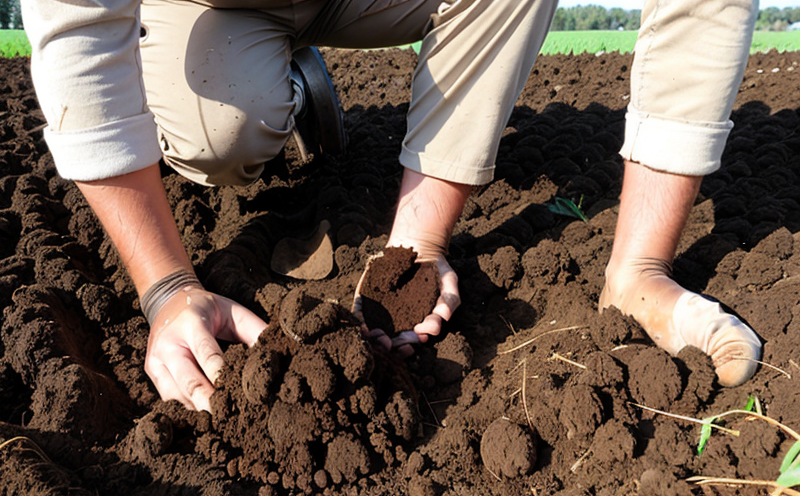Soil Enzyme Activity Testing
In agriculture and forestry testing, soil enzyme activity plays a crucial role in assessing the health and productivity of soils. Soil enzymes are biological catalysts that facilitate various chemical reactions essential for plant growth and nutrient cycling. The activity level of these enzymes is an important indicator of soil quality and fertility. This test measures the enzymatic activity present in agricultural and forestry soils, providing insights into the soil's biological vitality and its capacity to support sustainable crop production.
Enzyme activity testing involves a series of steps that ensure accurate measurement. Soil samples are first collected using standardized methods that account for depth and homogeneity. Once obtained, these samples undergo rigorous preparation to remove any interference from external factors such as moisture content or pH levels. After careful processing, the soil is analyzed for key enzymes like cellobiase, invertase, and dehydrogenases. These enzymes are critical in breaking down complex organic compounds into simpler forms that plants can utilize.
The testing process itself relies on precise methodologies, often involving incubation steps at controlled temperatures. The use of colorimetric assays is common for quantifying enzyme activity by measuring the rate at which substrates are converted to products. This allows for the calculation of specific enzyme activities based on international standards such as ISO 17266:2019 and ASTM D4358-18.
Understanding soil enzyme activity is vital not only in agricultural contexts but also in forestry, where it influences nutrient availability and decomposition processes. For instance, higher levels of dehydrogenase activity indicate a more active microbial community, which can enhance the overall health of forest ecosystems. Similarly, invertase activity provides information on sugar metabolism within the soil, an aspect crucial for both crop growth and tree health.
The results from enzyme activity testing are invaluable for quality managers, compliance officers, R&D engineers, and procurement specialists. They offer a clear picture of how efficient nutrient cycles are operating in soils, helping stakeholders make informed decisions about land management practices and fertilizer applications. By leveraging this information, agricultural and forestry operations can optimize resource use, improve productivity, and ensure long-term sustainability.
- International Acceptance and Recognition:
- The test results are internationally recognized by organizations such as the Food and Agriculture Organization (FAO) of the United Nations for assessing soil health.
- Compliance with ISO standards ensures that testing methods are consistent across different regions, facilitating global trade in agricultural products.
Why It Matters
The significance of soil enzyme activity cannot be overstated. Enzymes are the backbone of biological processes that support plant growth and nutrient availability in soils. When these enzymes function optimally, they ensure efficient decomposition of organic matter into forms readily available to plants. This not only enhances crop yield but also promotes healthier root systems and improved overall soil structure.
From an ecological perspective, enzyme activity is a key indicator of the health of microorganisms in the soil. A vibrant microbial community contributes significantly to carbon sequestration, which is critical for mitigating climate change impacts. Additionally, it influences the retention of nutrients within the root zone, reducing erosion and runoff, thereby enhancing environmental sustainability.
For agricultural producers, understanding enzyme activity helps tailor fertilization strategies precisely according to soil needs. Over-fertilization can lead to nutrient imbalances, whereas under-application may result in suboptimal yields. By measuring enzyme levels, farmers can achieve the perfect balance, leading to higher efficiency and profitability.
In forestry, enzyme activity testing is essential for maintaining healthy ecosystems that support diverse plant life. The data gathered helps foresters make informed decisions about silviculture practices, ensuring sustainable forest management. This includes optimizing tree planting densities and selecting appropriate species based on soil conditions.
International Acceptance and Recognition
- ISO Standards: Compliance with ISO standards ensures that the testing methods are consistent across different regions, facilitating global trade in agricultural products. For instance, ISO 17266:2019 provides guidelines for soil enzyme activity determination.
- FAO Recommendations: The Food and Agriculture Organization of the United Nations (FAO) recommends soil enzyme activity testing as a key component in assessing soil health. This test is widely recognized for its role in ensuring food security worldwide.
Environmental and Sustainability Contributions
The measurement of soil enzyme activity contributes significantly to environmental sustainability by promoting efficient nutrient cycling, reducing greenhouse gas emissions, and enhancing carbon sequestration. By fostering healthy microbial communities in the soil, these tests support a more resilient agricultural sector capable of adapting to climate change challenges.
Moreover, this testing method supports sustainable forestry practices that focus on maintaining biodiversity and conserving natural resources. The insights gained from enzyme activity testing enable foresters to implement strategies that protect ecosystems while supporting economic activities like timber harvesting and tourism.





